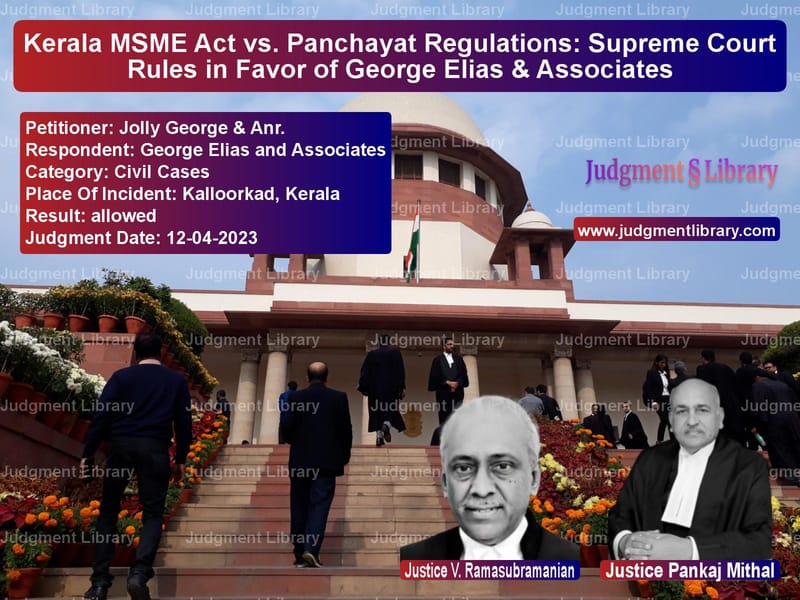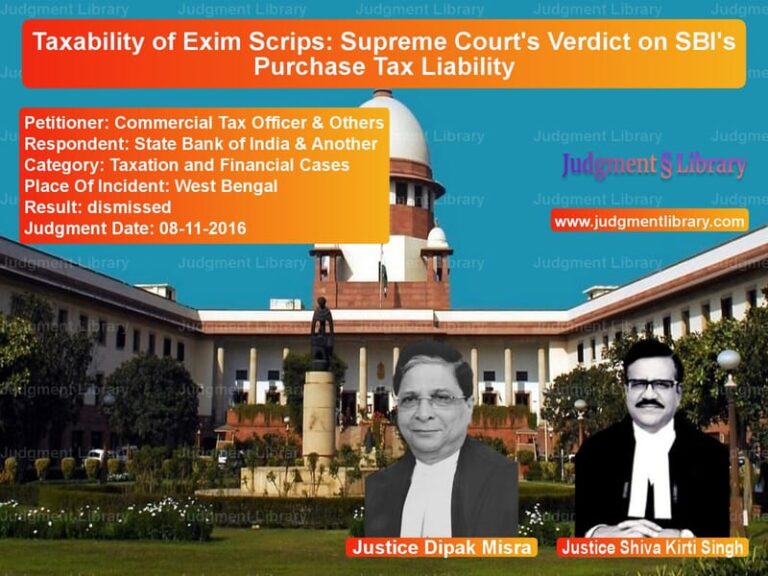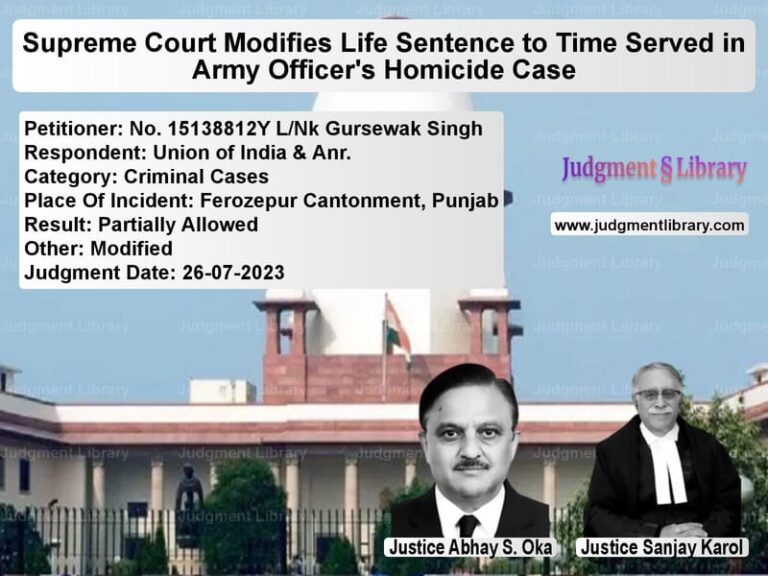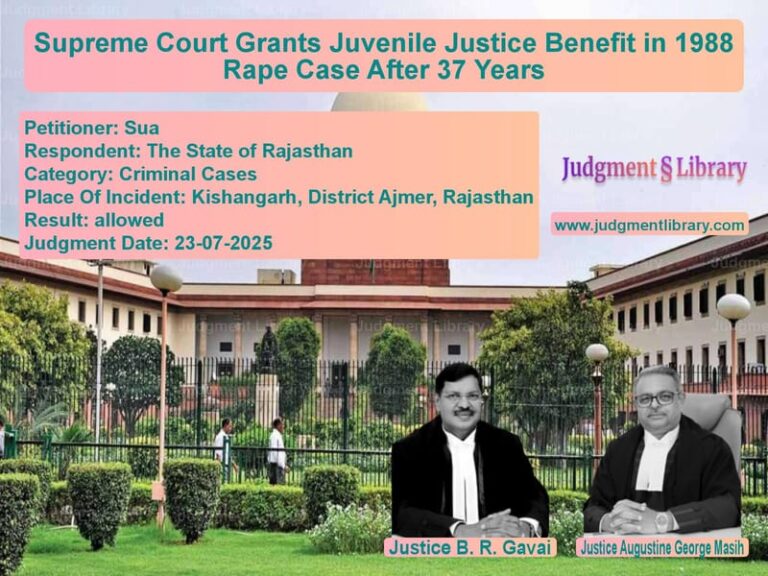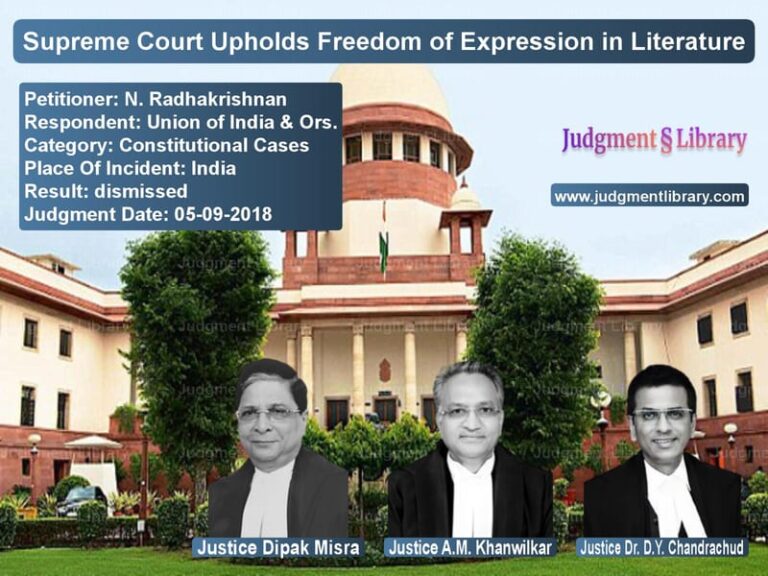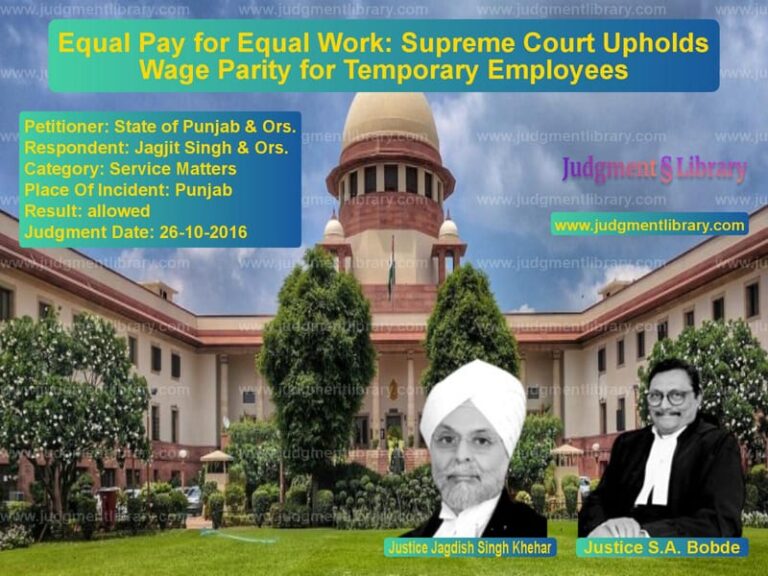Kerala MSME Act vs. Panchayat Regulations: Supreme Court Rules in Favor of George Elias & Associates
The Supreme Court of India recently delivered a crucial judgment in the case of Jolly George & Anr. vs. George Elias and Associates, which revolved around the applicability of the Kerala Micro Small and Medium Enterprises Facilitation Act, 2019 (Kerala MSME Act) and its overriding effect on local panchayat regulations under the Kerala Panchayat Raj Act, 1994. The case was significant in determining whether a business entity holding an Acknowledgement Certificate under the Kerala MSME Act needed additional approvals from the local panchayat for setting up an industrial unit.
The Supreme Court ruled in favor of George Elias and Associates, allowing them to proceed with their Hot Mix Plant installation without requiring further permission from the Kalloorkad Panchayat. The ruling reaffirmed the primacy of the Kerala MSME Act over local regulations and underscored the importance of streamlining industrial approvals to promote ease of business.
Background of the Case
The dispute began when George Elias and Associates, a road construction firm, sought to establish a Hot Mix Plant in the Kalloorkad Gram Panchayat area. The company applied for a license on February 5, 2020, but received no response from the panchayat. Subsequently, they obtained an Acknowledgement Certificate under Section 5 of the Kerala MSME Act, which provides automatic approval for business operations for three years.
Despite obtaining the necessary approvals from the Kerala State Pollution Control Board on March 4, 2020, objections were raised by local residents affiliated with political parties, leading the panchayat to reject the application on May 12, 2020. Aggrieved by this decision, George Elias and Associates filed a writ petition in the Kerala High Court, seeking to overturn the panchayat’s order.
Legal Proceedings
High Court Decision
The Kerala High Court ruled in favor of George Elias and Associates, holding that since the company had already obtained environmental clearance, the panchayat could not withhold permission under the Kerala Panchayat Building Rules, 2019. However, the High Court did not explicitly acknowledge the overriding effect of the Kerala MSME Act, leading to further appeals.
Appeals Filed
- Local residents challenged the High Court’s ruling, arguing that the panchayat had the authority to regulate businesses within its jurisdiction.
- George Elias and Associates also appealed, seeking a declaration that no separate license was required under the Kerala Panchayat Raj Act, 1994.
Arguments Presented
Petitioner (George Elias and Associates) Arguments
- The Kerala MSME Act grants an Acknowledgement Certificate, which functions as a substitute for all other state approvals.
- Under Section 10 of the Kerala MSME Act, its provisions override the Kerala Panchayat Raj Act, 1994 and similar local laws.
- The firm had already obtained consent from the Kerala State Pollution Control Board, ensuring environmental compliance.
- Requiring additional approval from the panchayat would defeat the purpose of the Kerala MSME Act, which aims to streamline industrial approvals.
Respondents (Panchayat & Local Residents) Arguments
- Acknowledgement Certificates under the Kerala MSME Act should not completely eliminate the requirement for local permissions.
- The Panchayat has a duty to regulate industries within its jurisdiction to prevent environmental hazards and public nuisances.
- The Rules under the Kerala MSME Act require applicants to undertake compliance with local building regulations.
- The Supreme Court should consider reading down the overriding effect of Section 10 of the Kerala MSME Act in public interest.
Supreme Court’s Observations
The Supreme Court, comprising Justices V. Ramasubramanian and Pankaj Mithal, analyzed the statutory provisions and made the following observations:
- The Acknowledgement Certificate under Section 5 of the Kerala MSME Act functions as an automatic approval for industrial activities for three years.
- Section 10 of the Kerala MSME Act clearly states that it overrides other state laws, including the Kerala Panchayat Raj Act, 1994.
- The Panchayat’s refusal to grant a license was contrary to the intent of the Kerala MSME Act, which seeks to facilitate industrial growth.
- The overriding effect of the Kerala MSME Act does not negate compliance with environmental laws such as the Environment (Protection) Act, 1986 and the Air and Water Pollution Acts. Since the firm had already obtained environmental clearance, no further permission was required from the Panchayat.
- The argument that local governing bodies must have a say in business approvals was rejected on the basis that the Kerala MSME Act was enacted precisely to remove redundant bureaucratic barriers.
Final Judgment
The Supreme Court ruled in favor of George Elias and Associates, granting them the relief they sought. The key takeaways from the judgment include:
- The Kerala MSME Act has an overriding effect on state laws, including local panchayat regulations.
- Once an entity has received an Acknowledgement Certificate and environmental clearance, no additional permission from the panchayat is required.
- The panchayat cannot reject business approvals arbitrarily if the company meets statutory requirements.
- The appeals filed by the local objectors were dismissed, reaffirming the business-friendly approach of the Kerala MSME Act.
Implications of the Judgment
This ruling has far-reaching implications for businesses and local regulatory bodies in Kerala. By upholding the primacy of the Kerala MSME Act, the Supreme Court has:
- Strengthened the ease of doing business framework in the state.
- Reduced bureaucratic hurdles that previously hindered small and medium enterprises (SMEs).
- Clarified that industrial units meeting environmental and statutory compliance do not need redundant local approvals.
- Set a precedent that similar state-level MSME facilitation laws will take precedence over conflicting local regulations.
Conclusion
The Supreme Court’s ruling in Jolly George & Anr. vs. George Elias and Associates underscores the importance of policy clarity in promoting industrial growth. By affirming the overriding effect of the Kerala MSME Act, the Court has ensured that businesses can operate without unnecessary regulatory delays.
This judgment is a significant step in aligning local governance with state industrial policies and will likely influence future cases concerning conflicts between MSME facilitation laws and local body regulations across India.
Petitioner Name: Jolly George & Anr..Respondent Name: George Elias and Associates.Judgment By: Justice V. Ramasubramanian, Justice Pankaj Mithal.Place Of Incident: Kalloorkad, Kerala.Judgment Date: 12-04-2023.
Don’t miss out on the full details! Download the complete judgment in PDF format below and gain valuable insights instantly!
Download Judgment: jolly-george-&-anr.-vs-george-elias-and-ass-supreme-court-of-india-judgment-dated-12-04-2023.pdf
Directly Download Judgment: Directly download this Judgment
See all petitions in Contract Disputes
See all petitions in Property Disputes
See all petitions in Consumer Rights
See all petitions in Judgment by V. Ramasubramanian
See all petitions in Judgment by Pankaj Mithal
See all petitions in allowed
See all petitions in supreme court of India judgments April 2023
See all petitions in 2023 judgments
See all posts in Civil Cases Category
See all allowed petitions in Civil Cases Category
See all Dismissed petitions in Civil Cases Category
See all partially allowed petitions in Civil Cases Category

